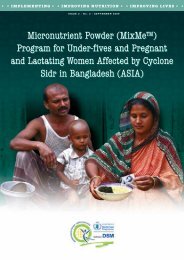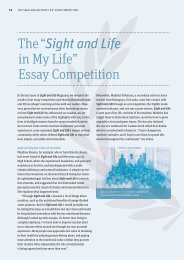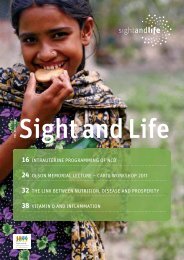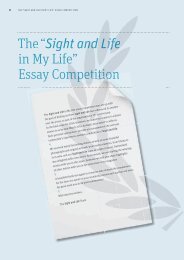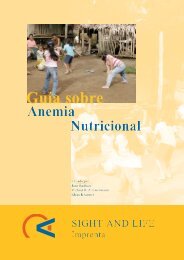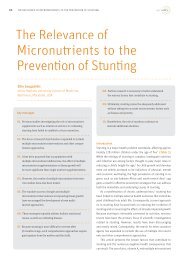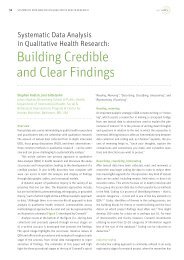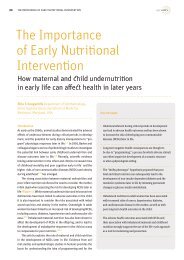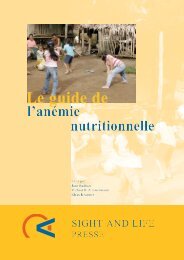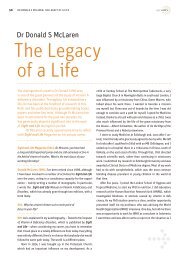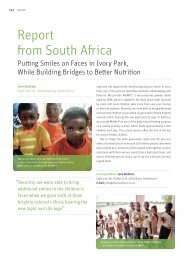Sight and Life Magazine 1/2011
Sight and Life Magazine 1/2011
Sight and Life Magazine 1/2011
Create successful ePaper yourself
Turn your PDF publications into a flip-book with our unique Google optimized e-Paper software.
SIGHT AND LIFE | VOL. 25 (1) | <strong>2011</strong>LETTERS TO THE EDITOR97Pesticide exposure around the worldHuman beings can be exposed to pesticides in a variety of ways,at different dose levels, <strong>and</strong> for varying periods of time. In thedeveloped world, the problem of acute pesticide poisoning haslargely been controlled; major health problems arise from exposureto low levels of pesticide residues in food over a long periodof time. In developing countries, however, the main healthproblem arising from pesticides is that due to acute poisoning.A minimum of 25 million agricultural workers in developingcountries suffer an episode of pesticide poisoning each year. 4It has become evident in the last few years that acute pesticidepoisoning is mainly the concern of the developing world, whichlacks appropriate protection <strong>and</strong> management mechanisms dueto low levels of awareness <strong>and</strong> inadequate infrastructures.Exposure to pesticides can potentially affect human health.Controlled studies on animals indicate substantial toxicologicalevidence showing that repeated low-level exposure to organophosphatepesticides affects neural development <strong>and</strong> growthin developing animals. Some of these studies indicate the impairmentof maze performance, locomotion <strong>and</strong> balance in neonatesexposed in the uterus <strong>and</strong> early in postnatal life. Possiblemechanisms leading to these effects include inhibition of brainacetylcholinesterase, down-regulation of muscarinic receptors,decreased brain DNA synthesis, <strong>and</strong> reduced brain weight. It isalso possible that exposure to organophosphate pesticides relatesto respiratory diseases in children through improper regulationof the autonomic nervous system. 5Studies of the effects of pesticide exposure on children’shealth have been limited to birth defects. Several case-controlstudies have associated parental exposure to pesticides or pesticideuse in the home with childhood brain tumors, leukemia,lymphomas, <strong>and</strong> testicular cancer. 6,7A small number of ecological studies have examined whetherthe low-level chronic exposure of children to pesticides can leadto adverse health consequences. A study in Mexico found thatchildren of four to five years of age living in an agricultural valleywith presumably higher pesticide exposure had deficits whentested for stamina, coordination, <strong>and</strong> recall, as compared to childrenliving in the foothills where there was mainly ranching. 8“Chronic, low-level exposureto pesticides may affect neurologicalfunctions, neurodevelopment,<strong>and</strong> growth”Advantages of organic food over conventional foodIn general it can be said that, despite the paucity of informationconcerning the potential health effects in children of chronic, lowlevelexposure to pesticides, substantial evidence from rodents<strong>and</strong> limited information from adult humans shows that chronic,low-level exposure to pesticides may affect neurological functions,neurodevelopment, <strong>and</strong> growth. The preference for organic foodover conventional food appears advantageous in view of the lowerexposure to insecticide residues <strong>and</strong> minimizing health risks.Correspondence: Michael Krawinkel,Institute of Human Nutrition, University of Giessen,Wilhelmstrasse 20, 35392 Giessen, GermanyE-mail: michael.krawinkel@ernaehrung.uni-giessen.deReferences01. Thurnham DI. Should Organically Produced Foods be Healthierthan Conventionally Grown Foods? <strong>Sight</strong> <strong>and</strong> <strong>Life</strong> <strong>Magazine</strong>2010;2:30–38.02. Curl CL, Fenske RA, Elgethun K. Organophosphorus PesticideExposure of Urban <strong>and</strong> Suburban Preschool Children with Organic<strong>and</strong> Conventional Diets. Environmental Health Perspectives2003;111:377–382.03. Baker BP, Benbrook CM, Groth E et al. Pesticide residues in conventional,IPM-grown <strong>and</strong> organic foods: Insights from three US datasets. Food Additives <strong>and</strong> Contaminants 2002; 19:427–446.04. Jeyaratnam J. Acute Pesticide Poisoning: A Major Global HealthProblem. World Health Statistics Quarterly 1990:43:139–144.05. Eskenazi B, Bradman A, Castorina R. Exposure of Children toOrganophosphate Pesticides <strong>and</strong> Their Potential Adverse Effects.Environmental Health Perspectives 1999;107:409–419.06. Blair A, Zahm SH, Pearce NE et al. Clues to cancer etiology fromstudies of farmers. Sc<strong>and</strong> J Work Environ Health 1990;18:209–215.07. Buckley JD, Robison LL, Swotinsky R et al. Occupational exposureof parents of children with acute nonlymphocytic leukaemia: areport from the Children’s Cancer Study Group. Cancer Research1989;49:4030–4037.08. Guillette EA, Meza MM, Aquilar MG et al. An anthropologicalapproach to the evaluation of preschool children exposed to pesticidesin Mexico. Environ Health Perspect 1998;106:347–353.



